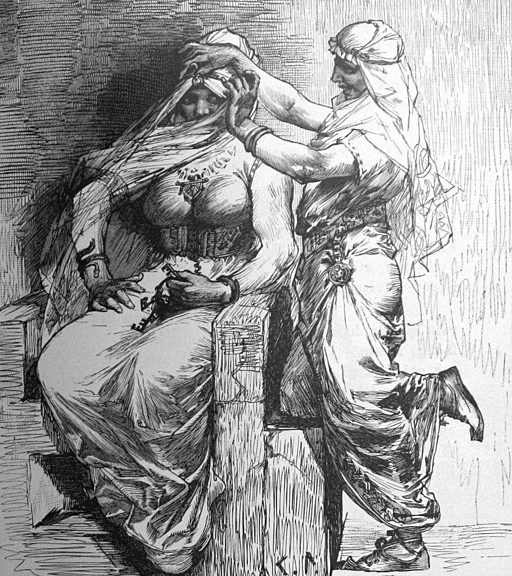Inbred Monkeys, Kindreds, and Lone Wolves. Are Kindreds Antiquated?
“Man is by nature a social animal; an individual who is unsocial naturally and not accidentally is either beneath our notice or more than human. Society is something that precedes the individual. Anyone who either cannot lead the common life or is so self-sufficient as not to need to, and therefore does not partake of society, is either a beast or a god. ”— Aristotle
One of the many solitary heathens who follows this blog asked me to say something about solitary heathens, and I thought it’d be a good idea. Whether you belong to a kindred, or whether you are solitary, chances are you’ve had thoughts about whether you can be a heathen with a kindred or not. Seeing as I do not claim a kindred, by Aristotle’s view I am a god or a beast. I know what my detractors would claim I am. But seriously, I have my thoughts about kindreds and about solitary heathens, so you can take this as a mixture of science, history, and opinion.
What Science has to Say
TL;DR: Scientists believe groups are a natural order because it helps defend against predators.
If we look at other primates, we can note that they too require some sort of social group. This isn’t exclusive to primates, per se, it appears to be a natural order among many different species all the way down to insects such as bees and ants. In the higher order lifeforms, we note that most animals are in social orders for protection, mating, and territory.
 |
| Thanks to Magickalgraphics.com |
Science has determined that the primates’ social order didn’t begin as a couple and increase. Rather, it’s likely that there were many related females and several unrelated males in the social order. (Of course, there are variations to this.) This social structure occurs not only for diversifying the genetics and avoiding inbreeding, but also for protection. Solitary hunters are generally nocturnal, and nocturnal animals are often solitary. They use the night to hunt and to conceal them from larger and more dangerous predators. Of course there are exceptions to the rule, that’s basically how it works. Animals that are mostly diurnal tend to run in groups because solitary animals can be seen and picked off easier by predators in the daytime. Numbers provide a certain amount of safety.
When our ancestors went from nocturnal to diurnal, we stuck with groups for safety. This required a high degree of sociability, because we probably would’ve killed ourselves of with antisocial behavior.
Our Brains are Naturally Programmed for Groups
TL; DR: The biochemicals in our bodies makes us want to be social.
One interesting paper I read was the affect of certain neurotransmitters in our bodies to our behavior to become more social or antisocial. People who had increased serotonin levels tended to behave more social. Heightened levels of oxytocin cause people to form bonds between mates, and between parents and offspring. This also causes a heightened need to protect families.
We as humans have evolved to be social animals, which is why when people have lower doses of serotonin, we can assume that they may have problems such as depression and other conditions that may cause us to become more isolated.
Nature as the Basis for Kindreds
TL; DR: If we look at the history of humans, it’s obvious that in earlier times people arranged themselves in kindreds similar to other primates for protection.
When we look at kindreds, we can kind of see how the older kindreds were arranged, potentially in the fashion I mentioned above with related females and unrelated males. This is a natural construct to protect diurnal primates which humans have inherited. A “lone wolf” human was unlikely to survive without some sort of group. The world was a pretty scary place back then, and people had to band together in order to survive. As hunter/gatherers, and later, as farmers, we needed a group structure to live in. This structure offered us protection from the natural predators, and from other groups of humans.
At this point, I can see the recon heathens applauding my statements. Ah hah! They think I’ve agreed with them. Lone wolves have no place in heathenry, or so they think. Guess what? They do have a place in heathenry. Let me continue.
 |
| Thanks to Magickalgraphics.com |
Times Change; People Change
TL;DR: The rule of law has reduced the need for protection a kindred affords.
At this point, it’s easy to see why there was an inner-gard/utan-gard. The people within the inner-gard were those family and allies that needed to be cared for or defended. The utan-gard were those who did not belong. Even so, heathenry insists on courtesy to strangers because the world was a difficult place. The ethics of reciprocity is very much part of the heathen belief.
As the rule of law (thanks, Tyr!) took over, the need for kindreds dwindled. Unless you live in a country under complete chaos, the need for having warriors ready to defend the homestead is happily rare. The 20th Century saw the rise of the nuclear family — where a family consisted of parents and children. Sure, there were grandparents, aunts, uncles, cousins, etc., but seldom did they live in the same town, let alone the same home as you did.
Nowadays, the family has morphed to whatever the person needs. There are single parent households, there are households with same-sex parents, there are couples without kids, there are children being raised by grandparents, there are temporary marriages, etc. Whether or not you think this is right, that is irrelevant because it is how our society has changed. There are certainly extended families and kindred-like arrangements, but I’d argue that as long as the rule of law continues, there is less need for people to have kindreds for safety sake.
 |
| Thanks to Magickalgraphics.com |
Inbred Monkeys and Lone Wolves
TL;DR: Your kindred are the people whom you associate with and have relationships with, whether or not they believe in our gods. Joining a heathen kindred may be helpful but not mandatory.
We know from science that human beings have nearly gone extinct twice, thus making us a little more than inbred monkeys. I suspect (and this is my conjecture) that it makes us hang onto certain traits a little longer than we really need to. The need to be social may be one of those traits that has been ingrained for a long time, although whether we need it or not can be debated. I would argue that there are some things you still need from society, even if you manage to become mostly self sufficient. No man is an island, as a teacher of mine once quoted John Donne.
When we look at following the gods and goddesses of our ancestors, do we really need to be in a group to do so? I would argue no, although you may get more out of being with others. There is a certain amount of comfort belonging to a kindred. I would also argue that you have a kindred already. You family and friends are your kindred, even if they are not followers of your path. These are the people you go to when you need help; these are the people whom you help.
What’s more, we have bigger distances than even the Vikings traveled when it comes to finding folks who believe in our religion. And even if we find people who are heathens, there’s no guarantee we’re going to get along. We know that our ancestors didn’t just get along because they believed in the same gods.
The other side of the coin is that technology has made it so that we can have virtual kindreds. I mean, let’s face it, we can meet via chat rooms and even attend conferences real time. So, even if you are a “lone wolf” heathen practitioner, you can still get some of the benefits being in a group.
To Recap
Our social behavior came about as an evolutionary adaptation to protect ourselves from predators. We have found it useful behavior as we cannot do everything we need to survive in most situations. (Self sufficient people still rely on tools purchased or obtained from others.) Nowadays, kindreds are less needed for protection, and are by their nature, a social construct. Your kindred are the people whom you associate with and have relationships with, whether or not they believe in our gods. Joining an Asatru or Heathen kindred is useful in many respects, but not mandatory, especially with the advent of the Internet.
So, solitary practitioners, despair not. Adaptation is one of the great things about us and our ancestors. You don’t need to belong to a heathen kindred to follow our gods. They are helpful, but not necessary to be a heathen.
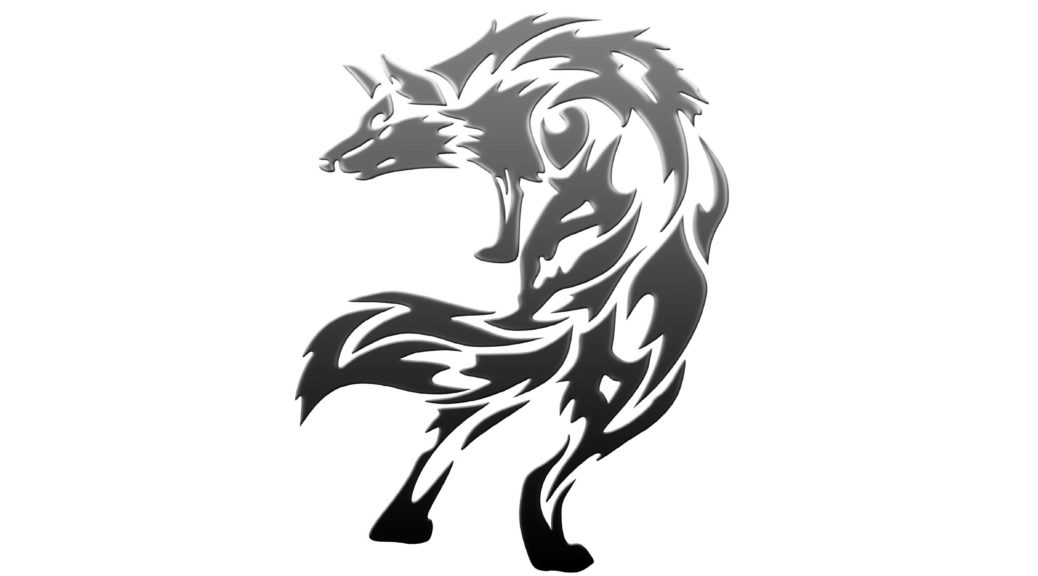









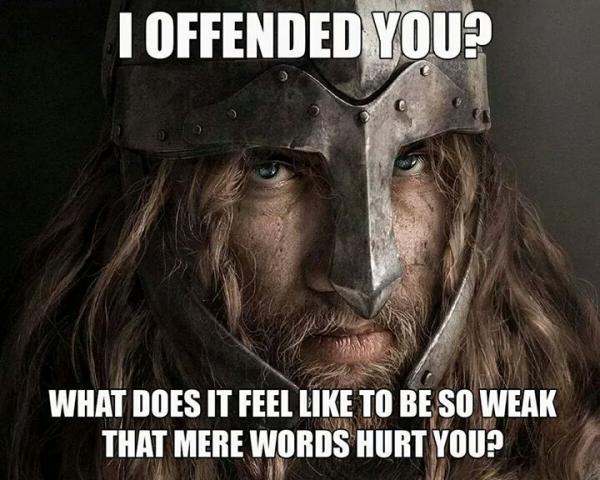
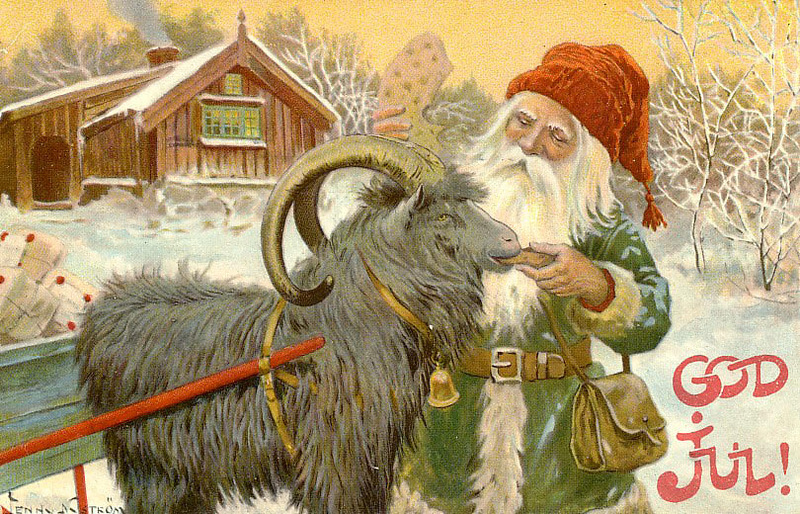




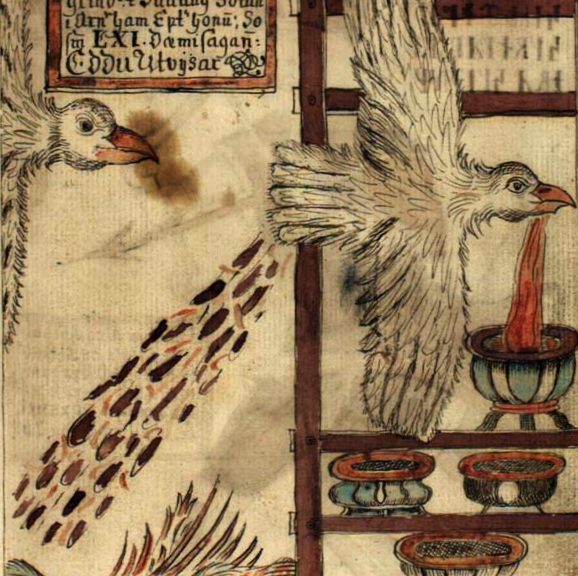

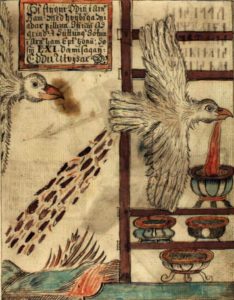 goes around the world imparting his wisdom to those who would learn it. Somehow Kvasir didn’t get the memo that two dwarves named Fjalar and Galar were up to no good and killed him. They crafted the mead of poetry from his blood (another ewww), and anyone who drank from it was given great wisdom and poetry. To make a long story short, a Jotun eventually kills the dwarves and secrets the mead in a mountain with his daughter. Odin gets wind of this, goes undercover, seduces the daughter, steals the mead in his beak, and flees in the form of an eagle back to Asgard with the Jotun on his heels, errr… tail feathers? So close, he poops out some of the mead, which was not saved. (And anyone can partake of the bird droppings with predictable results.) The rest Odin give to the Aesir and doles out sparingly to those people gifted with poetry.
goes around the world imparting his wisdom to those who would learn it. Somehow Kvasir didn’t get the memo that two dwarves named Fjalar and Galar were up to no good and killed him. They crafted the mead of poetry from his blood (another ewww), and anyone who drank from it was given great wisdom and poetry. To make a long story short, a Jotun eventually kills the dwarves and secrets the mead in a mountain with his daughter. Odin gets wind of this, goes undercover, seduces the daughter, steals the mead in his beak, and flees in the form of an eagle back to Asgard with the Jotun on his heels, errr… tail feathers? So close, he poops out some of the mead, which was not saved. (And anyone can partake of the bird droppings with predictable results.) The rest Odin give to the Aesir and doles out sparingly to those people gifted with poetry.






